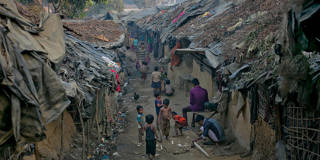The plight of Muslim Rohingya communities in Myanmar’s Rakhine state is worsening by the day, and could soon imperil the country’s government and the reputation of its leader, the Nobel laureate Daw Aung San Suu Kyi. Worse, the crisis could divide the region along ethno-religious lines and stoke support for Islamist extremism.
DHAKA – The worsening plight of Muslim Rohingya communities in Myanmar’s Rakhine state could soon imperil the country’s government, as well as the reputation of its leader, the Nobel Peace Prize laureate Daw Aung San Suu Kyi. The crisis has been escalating since last October, when Myanmar’s military launched an offensive in which 130 Rohingya were killed, and dozens of their buildings were torched. At the time, the military’s leaders claimed that the attack was part of an effort to locate unidentified insurgents who were thought to be responsible for the slayings on October 9 of nine policemen at three border posts in the district of Maungdaw.
According to a Human Rights Watch analysis of satellite images, still more Rohingya villages were destroyed over the course of nine days in November, bringing the number of buildings razed to 1,250; meanwhile, 30,000 people have reportedly been displaced. The United Nations considers the stateless Rohingya to be among the world’s most persecuted minorities.
Now, other countries in an otherwise stable region are becoming embroiled in the crisis; indeed, countries such as Bangladesh, Thailand, and Indonesia are increasingly feeling the spillover effects, as Rohingya seek asylum within their borders. The persecution of the Rohingya can no longer be described as merely a domestic problem for Myanmar.

DHAKA – The worsening plight of Muslim Rohingya communities in Myanmar’s Rakhine state could soon imperil the country’s government, as well as the reputation of its leader, the Nobel Peace Prize laureate Daw Aung San Suu Kyi. The crisis has been escalating since last October, when Myanmar’s military launched an offensive in which 130 Rohingya were killed, and dozens of their buildings were torched. At the time, the military’s leaders claimed that the attack was part of an effort to locate unidentified insurgents who were thought to be responsible for the slayings on October 9 of nine policemen at three border posts in the district of Maungdaw.
According to a Human Rights Watch analysis of satellite images, still more Rohingya villages were destroyed over the course of nine days in November, bringing the number of buildings razed to 1,250; meanwhile, 30,000 people have reportedly been displaced. The United Nations considers the stateless Rohingya to be among the world’s most persecuted minorities.
Now, other countries in an otherwise stable region are becoming embroiled in the crisis; indeed, countries such as Bangladesh, Thailand, and Indonesia are increasingly feeling the spillover effects, as Rohingya seek asylum within their borders. The persecution of the Rohingya can no longer be described as merely a domestic problem for Myanmar.